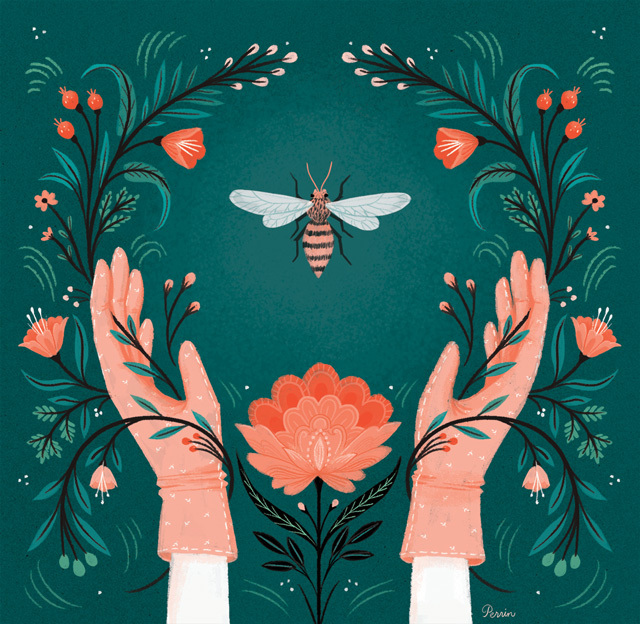Bees may be tiny but they sure are mighty: they play a major role in our environmental balance and pollinate one-third of our food supply. They’re also dying at an unprecedented rate due to disease, pesticides, colony collapse, and climate change. Carly Stein has first-hand experience with bees’ life-altering effects. She was studying abroad and suffering from a severe case of tonsillitis when an Italian pharmacist recommended propolis, a protective substance made by bees to line hive walls, which quickly cured her. Unable to find propolis in her Canadian hometown, she connected with a local beekeeper, learned all about these crucial insects, and turned her passion for them into purpose: founding Beekeeper’s Naturals, which ethically sources bee products like propolis, royal jelly, and raw honey. Working with small-scale beekeepers around the world, she knows a thing or two about protecting our pollinators. Here are her tips.
Make your outdoor space bee-friendly.
Plant flowers in your yard, or on your balcony or fire escape “giving bees access to clean food, which unfortunately is in short supply.” Ideal plants are native to your region, produce brightly colored flowers, and are grown from organic heirloom seeds.
Skip the Roundup (and the lawn).
“One of the big factors that’s affecting the bee population right now is pesticides,” says Stein. “Their food sources are covered in a toxic substance called neonicotinoids, that mess up the bees’ spatial reasoning.” And ditch your lawn—a “desert wasteland for bees”—in favor of flowers and foliage.
Give bees a bath.
“Take a bowl, add shallow water and some rocks or mulch for the bees to perch on, and put it in a sunny area,” she says. “In the summer it’s really important to help them stay hydrated especially with the climate extremes we’re experiencing.”
Choose farmed goods carefully.
Commercial agriculture isn’t great for bees. Massive fields of only one crop severely limit their food sources, and are often treated with toxic pesticides. Almonds, which are almost entirely bee pollinated, are one of the worst offenders: “With commercial production demands for almonds, sometimes you’ll actually see them spraying pesticides while the bees are pollinating,” Stein says. Commercially grown berries are on the shit list, too, especially blueberries.
Ask questions.
And make informed choices. When you buy produce, ask about the source, the size of the producer (smaller is usually better), and whether it was grown with pesticides. With bee products, ask what the bees are eating (the correct answer is honey, not sugar water), and whether the products are third-party-tested for pesticides. “You can have real impact with your purchases by supporting companies that do things ethically.”
By Chris Ciolli
Illustrated by Lisa Perrin
This article originally appeared in the May/June 2019 print edition of BUST Magazine. Subscribe today!
More from BUST
What It Was Like To Attend Afternoon Tea In The Victorian Era
8 Irresistible Indulgences You Can’t Resist


